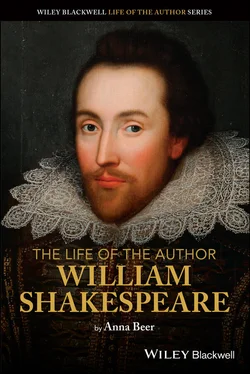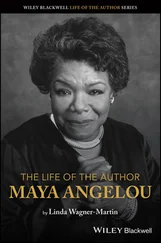Or perhaps William’s marriage in fact allows him to be an actor. An apprenticeship (and university for that matter) could not be combined with marriage, an actor’s life could. And that life could run parallel “with a very different life in Stratford” (Potter 2012, p. 55). Anne and the couple’s three very young children could and did live in there with William’s parents, while he – perhaps – toured the provinces with an acting troupe, moving in and out of the great houses of England, before ending up in London, his semi-permanent base, in 1588. 9
William may disappear from the records for seven years, but it is quite possible he did not disappear from Stratford at all. According to David Fallow, despite his marriage precluding a formal apprenticeship, John Shakespeare was not going to let his eldest son do anything other than join the family business. This entailed visits to London, and therefore when William surfaces in the city it is “exactly where and when contacts in the wool trade would have been vital to the survival of the family business.” Shakespeare therefore arrives in London as “a businessman rather than an impoverished poet” (Fallow 2015, p. 38).
In contrast, there are those who insist the pull of the theater for young William is heightened by the desire to leave Stratford: the “power of its language, the mystery of mimesis, the potential to travel away from provincial Warwickshire” all drew Shakespeare to the city (Dutton 2018, p. 28) – or to Lancashire. Those who view Shakespeare as a crypto-Catholic take William north in the later 1580s as schoolmaster (or possibly actor) in the household of Sir Thomas Hesketh, whose wife and at least one of his sons were active Catholics. 10Some add the idea that William was sent to Lancashire to get him away from (religious) trouble in Warwickshire. When Hesketh died in 1588, the argument goes, Shakespeare passed into the household of the Earl of Derby, Hesketh’s patron, and thence to the life of a touring actor and novice playwright with the Earl of Derby’s son, Ferdinando, Lord Strange, the patron of one of the leading acting companies of the 1580s. 11Shakespeare’s experiences touring with Lord Strange’s Men may even emerge in his plays: when he imagines a performance “it is not in a public playhouse but in the private space of a royal palace or a lord’s house” (Potter 2012, p. 55).
And yet, for all the lure of London, Shakespeare is unlike his younger contemporary Ben Jonson, who refers to the city’s streets and pubs and theaters in his plays. William “always retained something of a pre-urban sensibility, in which playing was closely attached to the service of a lord and to great private houses” (Dutton 2018, p. 38). Not just that, it is a Midlands’ pre-urban sensibility, because Shakespeare’s earliest plays are “dotted with names of places in the Midlands.” Shakespeare’s continued connection to his Warwickshire roots – understood variously as pre-urban, narrowly provincial, or idyllic pastoral, and existing in his imagination as much as his lived experience – is a powerful theme in many “Lives.”
When and why Shakespeare began working in the theater in London (or elsewhere) remains murky. What is clearer is that to be an actor was to exist on the edge of convention. On the one hand, an actor was merely a household retainer, a lowly, liveried member within a deeply hierarchical unit, organized around the service of a lord and patron. At the same time, an actor was one step away from a vagabond, a byword for bad behavior, dissolute, “loitering” fellows, disrespectful of authority, “passing from country to country, from one gentleman’s house to another, offering their service, which is a kind of beggary” (Van Es 2013, p. 8, quoting from Wickham, Berry, and Ingram 2020, pp. 157–171). 12Hidden behind the invective was a horror of social mobility: “a common theme is the players’ rapid rise from travelling minstrels to gaudy and wealthy men” (Van Es 2013, p. 8). Actors were indeed “entrepreneurs, seeking to make a living in a developing marketplace – though one contested by a number of different parties, notably the Crown (the Queen’s government); Parliament; their own aristocratic patrons; and local authorities, often in the form of their mayors and councils” (Dutton 2018, p. 28). Acting could, and did, transform men’s fortunes.
Particularly acting in London. The theater world in the city had been changing rapidly from the time of William’s early childhood when performances (whether amateur or professional) were attached to a specific occasion, and at the invitation, and under the control, of the person commissioning the performance. By the time William entered his teens, playing companies were working through much of the year, performing to paying audiences, and even providing a selection of plays at each venue. And a few brave visionaries had started building theaters: in 1567, a stage and scaffolding in a farmhouse called the Red Lion about a mile from the city walls; 10 years on, The Curtain; 20, and the Rose is being built. The steady rate of building suggests that business was good. London was thriving in the years after 1588, temporarily free of the major epidemics which led to playhouse closures, and a population of 200,000 made it far and away the biggest city in England.
By 1590 there were “at least four substantial buildings attracting acting companies to London, with smaller venues existing besides. Playhouses proper, although partly open to the elements, could shelter thousands of spectators and were equipped with tiring houses for the purpose of costume changes and space for the storage of theatrical properties. Their occupation was changeable: individual troupes would come and go depending on touring routes and the seasons. Alternative entertainment, such as fencing contests or animal baiting, was also an option for the owners when no suitable players were in town” (Van Es 2013, p. 11).
It was a volatile world, involving extensive touring away from the capital, not always without trouble. The Queen’s Men were in Dublin one month, invited to perform at the wedding of King James VI and Anne of Denmark in Edinburgh the next, with the more everyday mayor’s plays filling in the gaps. 13The death of a star performer in one company, the death of a patron of another, could change everything, as it did in 1588, the year in which Richard Tarlton (of the Queen’s Men) died and in which Lord Strange formed a new company from the remnants of the Earl of Leicester’s Men. Already disrupted when the earl had taken some of his playing troupe with him to war in the Low Countries, the company completely dissolved on Leicester’s death.
The new players moved swiftly “into the highest league,” not least because of the presence of Will Kemp, a comedian who was, almost, Tarlton’s equal (Dutton 2018, p. 61). Trouble came and was averted. The Lord Mayor, attempting to close the playhouses, instructed the two main London troupes (the Admiral’s and Strange’s Men) to stop playing. The former “dutifully obeyed, but the others in very contemptuous manner departing … went to the Cross Keys [an inn] and played that afternoon” (Chambers 1923, Volume 4, p. 305). Some of Strange’s players were imprisoned for their contempt, but most were protected by their patron.
Strange’s Men prospered, being awarded six slots in the Revels Calendar of 1591–1592, and three the next year. And between 19 February and 22 June 1592 they performed the first fully recorded London season, playing continuously at the Rose. Prior to this, no company had attempted to set up more-or-less permanent residence in London. The new permanent theaters were changing drama. In this first season of 105 days, no fewer than 27 plays were staged.
This was very different from touring, when companies would take three or four plays out on the road, with perhaps two or three new plays in their repertoire because they could rely on a new audience in the next town or great house. In London, there was a pressing need to get the playgoers back for more. The new public theaters needed more plays, more playwrights: a perfect recipe for the young actor, and aspiring playwright, William Shakespeare. He was not alone, of course: “As the commercial theatre expanded, many young men, primed with a command of rhetoric thanks to their training in the new grammar schools, made their way to the capital. Under-employed and highly literate, they were soon called upon to produce copy for the players, who (with large venues and longer periods of residence) were turning over material at an unprecedented rate” (Van Es 2013, p. 1). It was an era of unprecedented opportunity for an actor-playwright. The new playhouses (when they were permitted to open) needed new material, far more than had been required when companies only went on the road: “itinerant acting companies could succeed by repeating in different places a small inventory of plays” (Bednarz 2018, p. 22). Those “with an established urban-based clientele were, instead, compelled to acquire larger and more differentiated repertoires – including diverse and innovative comedies – in order to satisfy the expectations of inveterate theatre-goers who could choose among competing venues” (Bednarz 2018, p. 22).
Читать дальше











![Уильям Шекспир - The Works of William Shakespeare [Cambridge Edition] [Vol. 1 of 9]](/books/746589/uilyam-shekspir-the-works-of-william-shakespeare-c-thumb.webp)